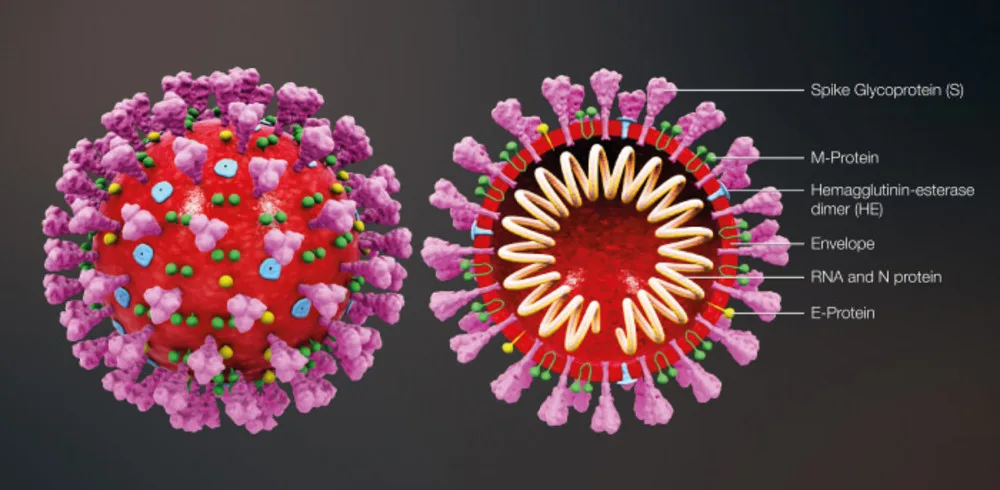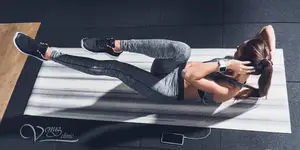
Coronavirus: what is it and how can I protect myself?
The coronavirus pandemic - COVID-19 has swept almost the entire world with a wave of panic. What matters first and what are the common misconceptions.
References Pritish K. Tosh, MD, Mayo Clinic *, USA
What is coronavirus and how can I protect myself?
A new virus called Coronavirus Severe Acute Respiratory Syndrome 2 (SARS-CoV-2) has been identified as the cause of an outbreak that began in China in 2019. The pandemic is called the 2019 coronavirus infection (COVID-2019).
The virus is a type of coronavirus, a family of viruses that can cause diseases such as the common cold, severe acute respiratory syndrome (SARS) and Middle East respiratory syndrome (MERS).

Severe Acute Respiratory Syndrome(SARS), better known as SARS, also known in the media as SARS, the first case of which was reported in November 2002 in the Chinese province of Gaundong.

COVID-19 outbreaks are being reported in an increasing number of countries, including the United States. WHO announced a global pandemic in March 2020. Public health groups such as the World Health Organization (WHO) and the US Centers for Disease Control and Prevention (CDC) are monitoring the situation and posting the latest news, treatment and prevention recommendations on their websites.
* MAYO CLINIC is known by every doctor, this clinic is ranked # 1 in the United States and # 1 in the ranking of clinics around the world, according to research by US News & amp; World Report. The Mayo Clinic is a nonprofit academic medical center based in Rochester, Minnesota with a focus on integrated clinical practice, education and research. The clinic specializes in treating difficult cases with tertiary care. The top ten medical schools of the Alix Clinic are concentrated here, as well as the largest educational programs in the United States. Mayo Clinic not only treats complex cases in various fields, but also has a strong scientific base and is engaged in clinical research. The Mayo Clinic spends over $ 660 million a year on research and has over 3,000 in-house studies.
How is COVID-19 spread?
The new coronavirus is transmitted mainly through contact with an infected person through coughing or sneezing, airborne droplets through the inhalation of droplets of saliva and nasal discharge.
What are the symptoms of coronavirus?
COVID-19 is a dangerous disease that can occur both in a mild form of an acute respiratory viral infection, including fever, cough and shortness of breath, or in a severe form. Specific complications can include viral pneumonia and, as a result, acute respiratory distress syndrome and respiratory failure.
Some people may have no symptoms.
Can coronavirus be prevented or cured?
As of today, the COVID-19 coronavirus vaccine is not available. Antiviral drugs are not recommended for the treatment of COVID-19. The main treatment is to relieve symptoms.
What can I do to avoid getting sick?
WHO and CDC recommend the following precautions to be taken to avoid COVID-19:
- Avoid crowded events;
- Do not be in close contact (about 180 cm) with people who are sick or have symptoms.
- Maintain your distance from those around you if COVID-19 is common in your environment, especially if you are at risk.
- Wash your hands often with soap and water for at least 20 seconds and treat them with an alcohol-based hand sanitizer (with at least 60% alcohol).
- Cover your mouth and nose with a bend of your elbow or tissue when you cough or sneeze. Throw it away immediately after use.
- Avoid touching your eyes, mouth and nose with your hands unless your hands are sterile.
- Wipe down and disinfect surfaces you touch frequently.
WHO also recommends:
- Avoid eating raw, undercooked meats and organ meats.
- If you visit unplanned markets in areas where new cases of COVID-19 have been reported, avoid contact with animals or surfaces they may have touched.
- If you have a chronic medical condition and are at risk, consult your doctor about additional protective measures.
What should I NOT be doing to protect myself from COVID-19?
The CDC does NOT recommend that healthy people use a mask to protect against respiratory diseases, including COVID-19. Use the mask only if recommended by your doctor.
Can I travel the world?
Maybe. If you plan to travel the world, first check the WHO and CDC websites for updates and recommendations. Also pay attention to the medical advice in the countries you are planning to visit.
What can I do if I am sick or at risk of COVID-19?
Follow standard precautions to avoid respiratory illness and COVID-19, such as frequent hand washing and use of disinfectants, coughing and sneezing rules, disinfecting frequently used surfaces, and avoiding sharing personal belongings with others.
If you have symptoms or have been exposed to the virus that causes COVID-19:
- Contact your doctor now if you have symptoms of COVID-19 and are exposed to the virus.
- Tell your doctor if you have recently traveled and lived in an area with high incidences of COVID-19 as determined by WHO and CDC.
- Tell your doctor if you have been in close contact with someone who has been diagnosed with COVID-19.
- Before you see your doctor, call and let them know about your visit so they can prepare and make sure other visitors are not exposed.
If you have symptoms, have been exposed to a virus that causes COVID-19, or have a confirmed COVID-19 diagnosis:
- If you are sick, stay at home, and do not go to work or other public places, unless you plan to receive medical attention.
- Avoid using public transportation if you are sick.
- Stay isolated in a separate room from family and pets whenever possible. Use a mask when in contact with other people.
- Avoid sharing dishes, glasses, bedding and other household items if you are sick.
- Use a separate bathroom from the family if possible.
- Stay at home for the period recommended by your doctor.
- You may need hospital treatment if you are very ill.
If you are using a reusable mask
- The mask must be carefully removed (it is better to do this in the bathroom), without touching the front surface and immediately washed thoroughly with soap. Always treat the face mask like a conditionally infected mask and the hands that touch it like infected hands! Do not put the mask in the laundry basket.
- The damp mask must be ironed with a hot iron. Under the influence of steam and high temperature, the virus, bacteria and fungus are destroyed. Only after this step does the mask become sterile. Do not touch the mask, leave the mask on the ironing board.
- Do not touch the mask, wash your hands and wipe the handle of the iron des. product, only after that you can take the mask with clean hands.
- For storage, it is best to place the mask in a plastic bag and seal it tightly to avoid infection.
- If necessary, process the disinfectant hand and bag outside before removing and putting on the mask..
Friends, stay calm, take precautions and be healthy!
Taking care of you, Venus Clinic!
Coronavirus - Common Myths
Does garlic protect against coronavirus infection?
No, garlic has neither prophylactic nor therapeutic properties against coronavirus infection. Garlic's inherent antibacterial properties are ineffective against viral infections. Observations of patients in foci of infection show that eating garlic does not protect against infection and does not alleviate the course of the disease.
Drinking hot water destroys the virus
Hot water destroys the virus - that's right. But drinking hot water has no effect on the virus. Hot water, getting into the stomach, "cools" to the temperature of our body 36.6 - 37 ° C. The virus is localized mainly in the lungs, so even if hot water enters the stomach, the temperature of the lung tissue will not change, but a burn of the esophagus and stomach mucosa is quite easy to get.
Taking antibiotics helps with coronavirus
No. An antibiotic targets bacteria, not viruses. An antibiotic is prescribed when a bacterial infection is attached. Only a doctor can prescribe an antibiotic. Do not self-medicate, see your doctor.
Can mosquitoes carry the virus?
No, there are currently no known cases of transmission of COVID-19 by mosquitoes.
Ultraviolet lamps and coronavirus
Medical ultraviolet lamps are dangerous devices that can cause skin cancer, cataracts, burns and blindness, so medical ultraviolet lamps should not be used to prevent coronavirus at home.
Hot bath for coronavirus
Our body is a unique system that maintains a constant temperature inside the body in the range of 36.6 - 37 °C. A hot bath does not cause an increase in body temperature and does not have a preventive or therapeutic effect. Soap solution of any temperature removes the virus from the surface of the hands, face and body, which is the prevention of coronavirus infection.






